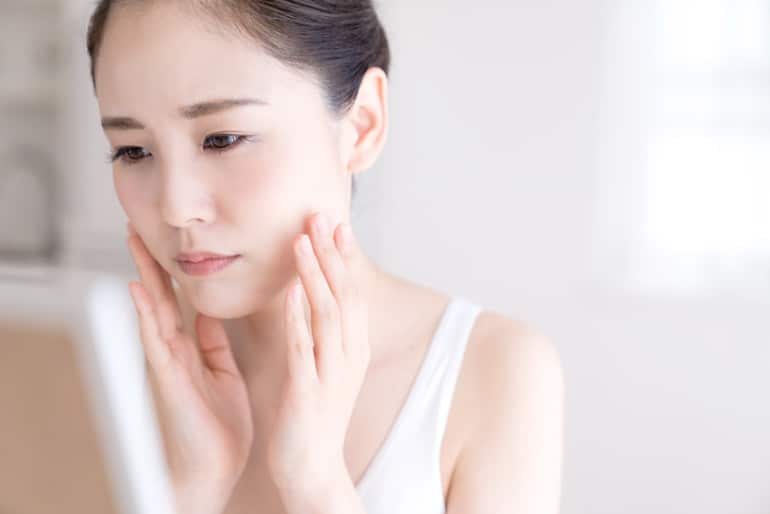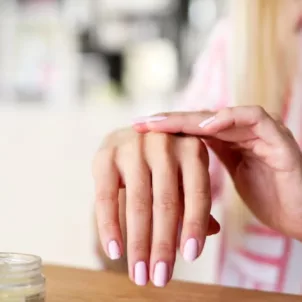Psychodermatology is a growing field that focuses on the mind-skin connection for healing and wellness that starts from within. Here’s what it’s all about.
Skin conditions and mental health are more interrelated than you may think.
In fact, Hippocrates—an Ancient Greek physician widely considered to be the father of clinical medicine—first wrote about the link between skin and stress millennia before the modern fields of dermatology, psychology, and psychiatry developed.
Fast forward to the present day: Around 25 percent to a third of those suffering from skin issues feel psychologically burdened by their appearance. Also, according to a 2018 study, individuals with acne have a 63 percent higher risk of developing major depression within a year of diagnosis.
If you or a loved one has ever suffered from severe breakouts, eczema, pruritus (itching), and the like, you know that dermatological insecurities are so much more than skin deep.
To learn more about the mind-skin connection, we spoke with Matthew Traube, MFT, a licensed therapist who specializes in psychodermatology.
What is psychodermatology?
While psychology and dermatology are both well-known disciplines, psychodermatology integrates the two for a holistic approach to address chronic skin concerns and compulsions.
“It’s the practice of how your skin influences your mind, and vice versa,” Matt explains.
While psychodermatology is still in its relative infancy stateside, the field has a more established presence in Europe.
How Psychodermatology Works
“Psychodermatology investigates the emotional impact of having a skin condition,” Matt continues. “What’s behind it? What are the triggers? What are psychological techniques to diminish those symptoms, both mentally and physically?”
The practice doesn’t only seek to help treat the skin concern, but also one’s perception of it.
Major goals of psychodermatology include:
- working past difficult experiences
- reducing the threats they impose
- developing coping mechanisms if/when recurrences arise
Once these psychological tools are sharpened, physical symptoms and/or habits tend to abate or disappear entirely.
Furthermore, psychodermatology fills important gaps in the healing process. Anyone who’s felt dismissed, unheard, or unseen following a doctor’s appointment understands how bedside manner is a critical component of treatment.
“The psychological impact of a skin condition can be influenced by how others perceive it,” Matt says. “For instance, if you leave an appointment feeling alone or defective—versus normal and supported—it can greatly impact your entire experience.”
What Treatment Looks Like
Matt says that most first-time patients are at the end of their rope, lacking confidence that he can help them. However, he dives into present and historical conditions that contribute to their physical issues and/or compulsions to find a common thread.
“I’m a bit of a detective at first,” he explains, “asking the who, what, where, when, and why behind the skin condition.”
Certain patterns may be recognizable from the fore, while others may require further investigation. “Since it can be difficult to remember and retain experiences accurately, I encourage my patients to jot down notes when flare-ups occur,” he continues.
Sooner than later, a clearer picture can emerge to perceive stimuli and stressors that contribute to physical manifestations. From there, they can focus on healing from the inside out.
Is It Necessary To WORK ALONGSIDE other professionals?
“An interdisciplinary approach to treatment is really helpful,” Matt advises. “Some dermatologists are open to collaborating, are very aware, and just get it. They’ll treat the physical manifestations of skin conditions, while I’ll cover their psychological aspects.”
He adds that other medical professionals will see patients who suffer from habits or compulsions and send them his way. “Some conditions, such as skin picking or hair pulling, have clear psychological components. If a person is suffering from stress, anxiety, or an emotionally challenging event, exploring the psychological influences can be very productive.”
Matt explains that the bearers of these particular conditions feel a sense of worthlessness and lack self-esteem. He cites a particular patient who picked at her skin upwards of 70 times per day. Fortunately, by exploring the multiple complex factors behind her compulsion, they were able to address the root of the problem. Through talk therapy alone, they were able to eradicate the habit and restore her self-worth.
Who could benefit from psychodermatology?
When I ask Matt whether stress or the skin condition begets the other, he says that it’s typically a chicken-or-egg situation.
However, he says that more often than not, someone will react emotionally upon seeing something manifest physically. Further, if you’re already predisposed to stress or anger, you’re more likely to respond strongly to flare-ups.
Matt advises that you could be a good candidate for psychodermatology if you:
- experience intense stress, shame, guilt, or hopelessness based on a skin condition
- have recurring problems at work, in your social life, or dating due to physical insecurities
- carry emotional baggage due to a painful history of skin- and/or hair-related issues or habits
Final Thoughts
“Psychodermatology is an important area. However, it’s a bit obscure and under-reported due to shame, guilt, and stigma,” Matt shares.
Some people may not recognize (or even believe) the links between skin conditions and mental health. Others may let embarrassment or a lack of faith impede them from seeking help. However, those suffering should know that the journey toward skin health and mental stability doesn’t have to be self-defeating or impossible.
In essence, the aim of psychodermatology is to improve one’s quality of life by remedying both unfavorable skin conditions and one’s perception of them.
However, Matt concludes, his sessions “often become less about the condition, and more about what you want out of life and how to get you there.”










